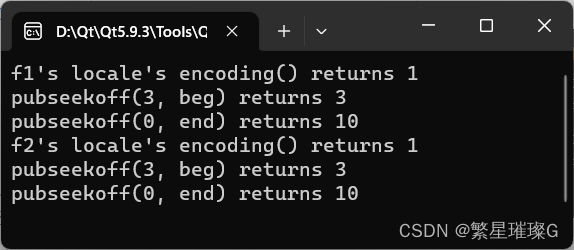定义于头文件 <fstream>
| template< class CharT, |
std::basic_filebuf 是关联字符序列为文件的 std::basic_streambuf 。输入序列和输出序列都关联到同一文件,并为两种操作维护连接文件位置。
函数 underflow() 和 overflow()/sync() 进行文件和缓冲区的获取放置区之间的实际 I/O 。 CharT 不是 char 时,多数实现在文件存储多字节字符,并用 std::codecvt 平面进行宽/多字节字符转换。
亦为常用字符类型定义二个特化:
| 类型 | 定义 |
filebuf | basic_filebuf<char> |
wfilebuf | basic_filebuf<wchar_t> |
受保护成员函数
提供用户供应的缓冲区,或将此 filebuf 转变为无缓冲
std::basic_filebuf<CharT,Traits>::setbuf| protected: |
若 s 为空指针且 n 为零,则 filebuf 变为对输出无缓冲,这表示 pbase() 和 pptr() 为空,而任何输出都被立即发送到文件。
否则,如同调用 setbuf() ,以用户提供的首元素为s 所指向的字符数组替换内部缓冲区(受控制字符序列),并允许此 std::basic_filebuf 将该数组中的至多 n 个字节用于缓冲。
此函数为受保护虚,它仅可通过 pubsetbuf() 或从导出自 std::basic_filebuf 的用户定义类调用。
参数
| s | - | 指向用户提供缓冲区的首个 CharT 的指针或空指针 |
| n | - | 用户提供缓冲区中的 CharT 元素数或零 |
返回值
this 。
注意
可以使用此函数时的条件,和使用提供的缓冲区的方式是实现定义的。
- GCC 4.6 libstdc++
setbuf() 仅可在 std::basic_filebuf 未与文件关联时调用(否则无效果)。拥有用户提供的缓冲区时,每次从文件读取 n-1 字节。
- Clang++3.0 libc++
setbuf() 可在打开文件后,但要在任何 I/O 前调用(否则可能崩溃)。拥有用户提供缓冲区时,从文件读取适合缓冲区的 4096 最大倍数字节。
- Visual Studio 2010
setbuf() 可在任何时候调用,即使在某个 I/O 发生后。缓冲区的当前内容若存在则丢失。
标准不定义此函数的任何行为,除了要求在任何 I/O 发生前调用的 setbuf(0, 0) 设置输出为无缓冲。
调用示例
#include <fstream>
#include <iostream>
#include <string>
int main()
{
int cnt = 0;
std::ifstream file;
char buf[10241];
file.rdbuf()->pubsetbuf(buf, sizeof buf);
file.open("test.txt");
if (!file.is_open())
{
std::cout << "open error" << std::endl;
}
for (std::string line; getline(file, line);)
{
++cnt;
}
std::cout << cnt << std::endl;
return 0;
}用相对寻址重寻位文件位置
std::basic_filebuf<CharT,Traits>::seekoff| protected: virtual pos_type seekoff( off_type off, |
若可能,则重寻位文件指针到距文件起始、结尾或当前位置准确 off 个字符的位置(取决于 dir 的值)。
若关联文件未打开( is_open()==false ),则立即失败。
若多字节字符编码依赖状态( codecvt::encoding() 返回 -1 )或为变长( codecvt::encoding() 返回 0 ),而偏移 off 非 0 ,则立即失败:此函数无法确定对应 off 个字符的字节数。
若 dir 不是 std::basic_ios::cur 或偏移 off 非 0 ,且此 filebuf 对象上最近做的操作是输出(即放置缓冲区非空,或最近调用的函数是 overflow() ),则调用 std::codecvt::unshift 确定需要的反迁移序列,并通过调用 overflow() 写入该序列到文件。
然后转换参数 dir 为 int 类型值 whence 如下:
dir 的值 | whence 的值 |
| std::basic_ios::beg | SEEK_SET |
| std::basic_ios::end | SEEK_END |
| std::basic_ios::cur | SEEK_CUR |
然后,若字符编码为定宽( codecvt::encoding() 返回某个正值 width ),则如同用 std::fseek(file, width*off, whence) 移动文件指针。
否则,如同用 std::fseek(file, 0, whence) 移动文件指针。
基类函数签名所要求的 openmode 参数通常被忽略,因为 std::basic_filebuf 只维护一个文件位置。
参数
| off | - | 要设置位置指示器到的相对位置。 | ||||||||
| dir | - | 定义要应用相对偏移到的基位置。它能为下列常量之一:
| ||||||||
| which | - | 定义要影响输入和/或输出序列的哪一个。它能为下列常量之一或其组合:
|
返回值
新构造的 pos_type 类型对象,存储结果文件位置,或在失败时为 pos_type(off_type(-1)) 。
注意
seekoff() 为 std::basic_streambuf::pubseekoff 所调用,它又为 std::basic_istream::seekg 、 std::basic_ostream::seekp 、 std::basic_istream::tellg 和 std::basic_ostream::tellp 所调用。
调用示例
#include <iostream>
#include <fstream>
#include <locale>
int main()
{
// 准备 10 字节文件,保有 4 个 UTF8 中的字符
std::ofstream("text.txt") << u8"z\u00df\u6c34\U0001d10b";
// 用非转换编码打开
std::ifstream f1("text.txt");
std::cout << "f1's locale's encoding() returns "
<< std::use_facet<std::codecvt<char, char, std::mbstate_t>>(f1.getloc()).encoding()
<< std::endl
<< "pubseekoff(3, beg) returns "
<< f1.rdbuf()->pubseekoff(3, std::ios_base::beg) << std::endl
<< "pubseekoff(0, end) returns "
<< f1.rdbuf()->pubseekoff(0, std::ios_base::end) << std::endl;
// 用 UTF-8 打开
std::wifstream f2("text.txt");
f2.imbue(std::locale("C"));
std::cout << "f2's locale's encoding() returns "
<< std::use_facet<std::codecvt<wchar_t, char, std::mbstate_t>>(f2.getloc()).encoding()
<< std::endl
<< "pubseekoff(3, beg) returns "
<< f2.rdbuf()->pubseekoff(3, std::ios_base::beg) << std::endl
<< "pubseekoff(0, end) returns "
<< f2.rdbuf()->pubseekoff(0, std::ios_base::end) << std::endl;
}输出























 2423
2423











 被折叠的 条评论
为什么被折叠?
被折叠的 条评论
为什么被折叠?








